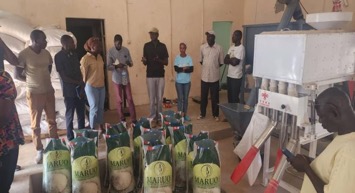
The World Food Programme (WFP) is currently supporting Maruo Farms with fortificants (premix), which is used to fortify rice that it produces and supplies to schools as part of the Schools Feeding Programme.
The group comprised representatives of the National Nutrition Agency, Food and Safety Quality Authority, The Gambia Standards Bureau, Ministry of Health and the media among other food fortification stakeholders.
The visit was aimed not only to see how the rice is fortified but to keep track of those doing fortification to know whether they are complying with standards.
The Gambia conducted a Micronutrient Survey in 2018 and it revealed that The Gambia has main micronutrient deficiencies, i.e. Vitamin A deficiency (VAD), Iron Deficiency Anaemia (IDA), and Iodine Deficiency Disorder (IDD).
Prior to the visit, the National Nutrition Agency (NaNA) organised three-days Fortification Monitoring and Surveillance (FORTIMAS) data collection training for stakeholders at Foni Ding Ding Bantaba Lodge in Bwiam.
The advocacy seeks to enable countries feasibly track trends in the effective coverage and nutritional impact of food fortification overtime in populations. FORTIMAS was developed and deployed and The Gambia introduced the use of this tool in 2021 to monitor the country’s food fortification programme.
The Catholic Relief Service (CRS) The Gambia Country Program (CP) granted NaNA additional funding from the Large-Scale Food Fortification Project to bolster stakeholder capacities in the FORTIMAS (data collection.)
Catherine Kutu Gibba-Omo, Program Manager for Monitoring, Evaluation and Research at the National Nutrition Agency (NaNA) described the visit as vital in their focus on fortification.
She observed that Maruo Farms is only able to meet half of the demand in supplying schools with fortified rice. However, she said plans are underway to increase the capacity to produce more.
“It is gratifying to know that we have people in the country who want to ensure that the population consume fortified rice especially the long grain,” she stated, noting that most of the rice we consume at the moment are the broken rice.
She pointed out the need to create awareness on the health implications of consuming broken rice as well as the benefits of consuming fortified rice especially the long(whole) grain.
She encouraged everybody to produce what they consume to ensure sustainability. She further said that encouraging people to venture into agriculture is more sustainable and will also ensure we consume fortified or the long (whole) grain rice.
Ousman Dem, Program Manager for Social and Behavioural Chance Communication (SBCC) at the National Nutrition Agency said fortifying rice can significantly help in addressing micronutrient deficiencies in the country.
“We believe fortification is one of the interventions that can help address micronutrient deficiencies. For us at the SBCC department we support and promote the industrial fortification but emphasis is on the Social and Behavioural Change Communication approach to address micronutrient deficiencies,” he explained while encouraging people to change behaviours by consuming foods that are rich in micronutrients.
He said where people cannot or are hesitant to consume the natural foods rich in micronutrients, they urged them to consume the industrially fortified foods, which are the food vehicles targeted for mandatory fortification in The Gambia (Fortified Rice, Iodised salt, Fortified Edible Fats and oil and Fortified wheat flour).
The Maruo Farms’ fortified rice is targeting schools as an intervention and Mr Dem said they hope and pray that someday Maruo Farms can expand to produce rice that is fortified for the general population. He also observed the need to support and build the capacity of Maruo Farms, thus, to enhance and maximise production thereby supplying fortified rice to at least 50 or more percent of the population.
By the time the country conducts its next micronutrient deficiency survey, Mr Dem noted that if those interventions are maintained and strengthened, we anticipate to see a reduction in micronutrient deficiencies in the country, which could be attributed to our contribution in the fight against micronutrient deficiency in The Gambia. .
Notwithstanding, he said there are plans to develop Regulations for rice. “The country has developed standards for fortified rice, which is however voluntary and we believe before it is turned into a technical regulation for enforcement there would have been a lot of improvement. We want to have a population that is healthy and free of micronutrient deficiencies,” he emphasised.
Bakary Kujabi, officer responsible for operations at Maruo Farms described their partnership with the World Food Programme as very fruitful.
He explained that the partnership was born out of the desire by the government of The Gambia in partnership with WFP to ensure that school going children have food that is healthy and quality enough to eat but also give them the opportunity to retain them in school. Mr Kujabi said their production challenges include level land fields, poor gates for water management in fields, birds that can finish a farm within 15 minutes, low civic education of farmers, inadequate combine harvesters, quality of rice from farmers, inadequate space for drying and storage among others.
He called on the Government and the private sector to work together to make sure there are more companies like Maruo Farms to be able to produce enough fortified rice for the Gambian population.
He noted that for them to expand, the right policies will have to be put in place to play their part.
He also highlighted the need for people to understand that what they produce at Maruo Farms is quality rice therefore people should not focus on price but rather the quality to be able to meet the 2030 target of reducing the importation level.
“Rice is everybody’s business and rice would always sell in The Gambia, make it your business and we can achieve our goal,” he concluded.
Meanwhile, Maruo Farms is a rice growing company involved in production, processing and marketing. It also offers services such as ploughing, harvesting, technical advice, organising farmers into groups, giving them inputs and also buying their rice, processing and selling it.





